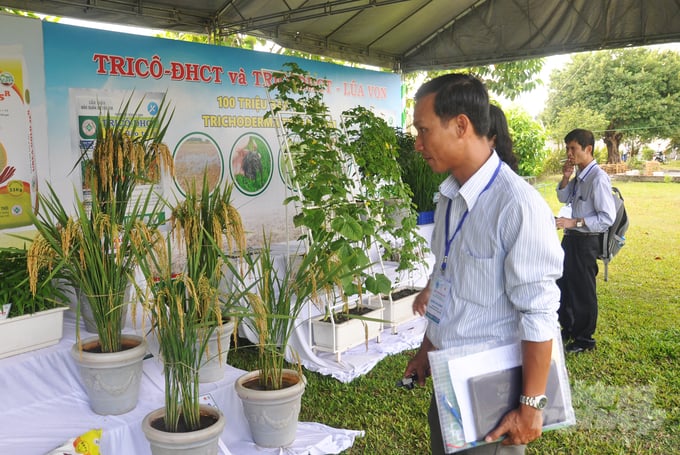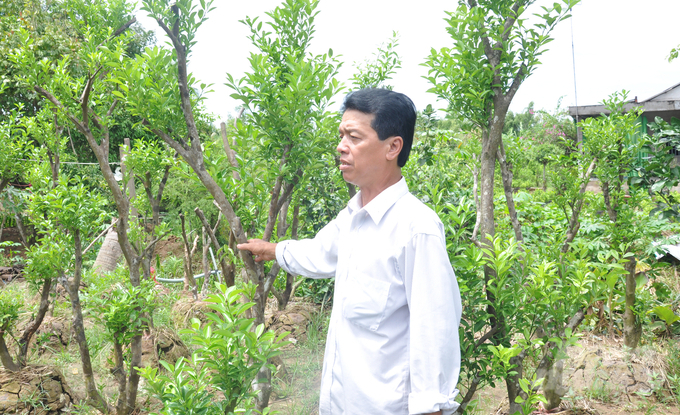May 30, 2025 | 15:11 GMT +7
May 30, 2025 | 15:11 GMT +7
Hotline: 0913.378.918
May 30, 2025 | 15:11 GMT +7
Hotline: 0913.378.918

Trico-ĐHCT product researched by Can Tho University has been transferred and applied effectively on crops in the Mekong Delta. Photo: Huu Duc.
Can Tho University has announced 116 innovative technologies and technological products, of which the most are in the fisheries sector, with 32 specialized products and technical processes. The agricultural industry has 13 technological products and processes. The remaining fields are technology, biotechnology, information technology, food technology, and environment.
Many research projects on fisheries have high applicability, such as water treatment in shrimp ponds, water environment monitoring, Breeding techniques, and production techniques for white-legged shrimp, black tiger shrimp, and giant freshwater shrimp; raise eels and yellow catfish.
In particular, some techniques in the artificial reproduction of aquatic breeds have also been successfully researched on Pangasius Micronema and Onychostoma Gerlachi. Many technological processes for producing marine species meet production needs, such as Pila Polita production techniques, Scatophagus Argus production techniques, etc.
In the field of agriculture, it is worth noting the technique of producing young vegetables on multi-layered shelves combined with LED lighting, applying CRIP/CAS9 technology to develop crops related to salt tolerance; management of Spodoptera exigua damage on onions with synthetic sex pheromones; Use microbial products containing purple non-sulfur phototrophic bacteria to reduce chemical fertilizers, treat saline soil with biochar in rice cultivation.
The research and technology transfer of Pila Polita seed production by the research team led by Associate Professor Ngo Thi Thu Thao, Department of Seafood Farming Techniques, Faculty of Fisheries, is highly appreciated. This new and unique technique uses nylon string substrates and industrial food to nurse the seeds to make the environment cleaner; the snails grow faster and achieve a higher survival rate, reaching more than 95% after 21 days of rearing. The research project was successfully applied and transferred to the experimental farm to produce breeds to provide farmers and train people in U Minh Thuong National Park, Kien Giang province.
The process of artificial reproduction and production of Pangasius Micronema led by Dr. Nguyen Van Trieu and a group of authors from Can Tho University also showed successful results. The research results on striped lizards reaching sexual maturity well in tank and pond culture conditions open up new prospects for the breeding and farming of this fish species, contributing to protecting natural fish resources.

Biotechnology solutions researched by Can Tho University have helped treat saline soil for orchards in Ben Tre. Photo: Huu Duc.
In the Mekong Delta's center, Can Tho University was founded in 1966. The University's mission is to focus on training, conducting research, and transferring technology to serve the sustainable development of the Mekong Delta region. CTU aims to strengthen its reputation to become one of the best universities in Vietnam, to be recognized throughout Asia-Pacific as an excellent education and research institution, and towards global integration.
Can Tho University has approximately 1,800 staff members, including nearly 1,100 teaching staff. The University has more than 46,000 students learning and doing research in 109 bachelor programs, 48 master programs, and 20 Ph.D. programs. Its strengths concentrate on agriculture, aquaculture, environment, and technology because it is located in the delta, which mainly produces rice, fish, shrimp, and fruits for the whole nation and for exporting. The University has around 300 local and international research projects annually with approximately VND 90 billion to support the Mekong Delta region.
Can Tho University's primary missions are training, conducting scientific research, and transferring technology to serve regional and national socio-economic development. In addition to its training responsibilities, Can Tho University has actively taken part in scientific research projects, applying the advances in scientific and technological knowledge to solving problems related to science, technology, economics, culture, and society in the region.
From achievements in its scientific research and international cooperation projects, the University has developed various products and technological production processes that benefit people's lives and promote export, thus helping the University gain prestige in national and international markets.
Every year, Can Tho University has 300 - 400 domestic topics and projects and 30 - 40 international projects implemented in 5 priority areas. During 2017 - 2022, the University has successfully implemented 36 large-scale and highly applicable scientific research programs. Products of diverse research projects and new technological processes are transferred and applied to practical production.
In early August 2023, Can Tho University held a signing ceremony of the Declaration of Cooperation and Memorandum of Understanding (MoU) with the Tokyo University of Marine Science and Technology (TUMSAT), Japan.
From 21st to 26th August 2023, the Can Tho University delegation visited six universities in Taiwan to strengthen cooperation in training, scientific research, student and staff exchange, collaboration with businesses, and community services.
Translated by Tu Quyen

(VAN) Due to a limited supply of workforce and competitive recruitment requirements, businesses struggle to retain talented veterinary human resources.

(VAN) WOAH’s guidance aims to mitigate disease risks through a One Health approach that balances economic, conservation, and public health interests.

(VAN) Ms. Nguyen Thi Dung, Deputy Director of Ngoc Hoang Cooperative, shared about the journey of bringing dragon fruit to Europe, achieving annual revenues in the billions of VND.

(VAN) Bamboo products from Thang Tho Bamboo Cooperative have reached many countries around the world, while also creating jobs for local workers.

(VAN) The Management Board of Con Dao National Park reported that a green sea turtle, tagged in the Philippines, has traveled thousands of kilometers to lay 84 eggs on Bay Canh Islet.

(VAN) Green technology is paving a new path for sustainable aquaculture in the Mekong Delta in particular and across the country in general, helping reduce emissions and adapt to climate change.

(VAN) On May 27, La French Tech Vietnam (the French startup and innovation community in Vietnam) held the French Tech Summit Vietnam 2025.